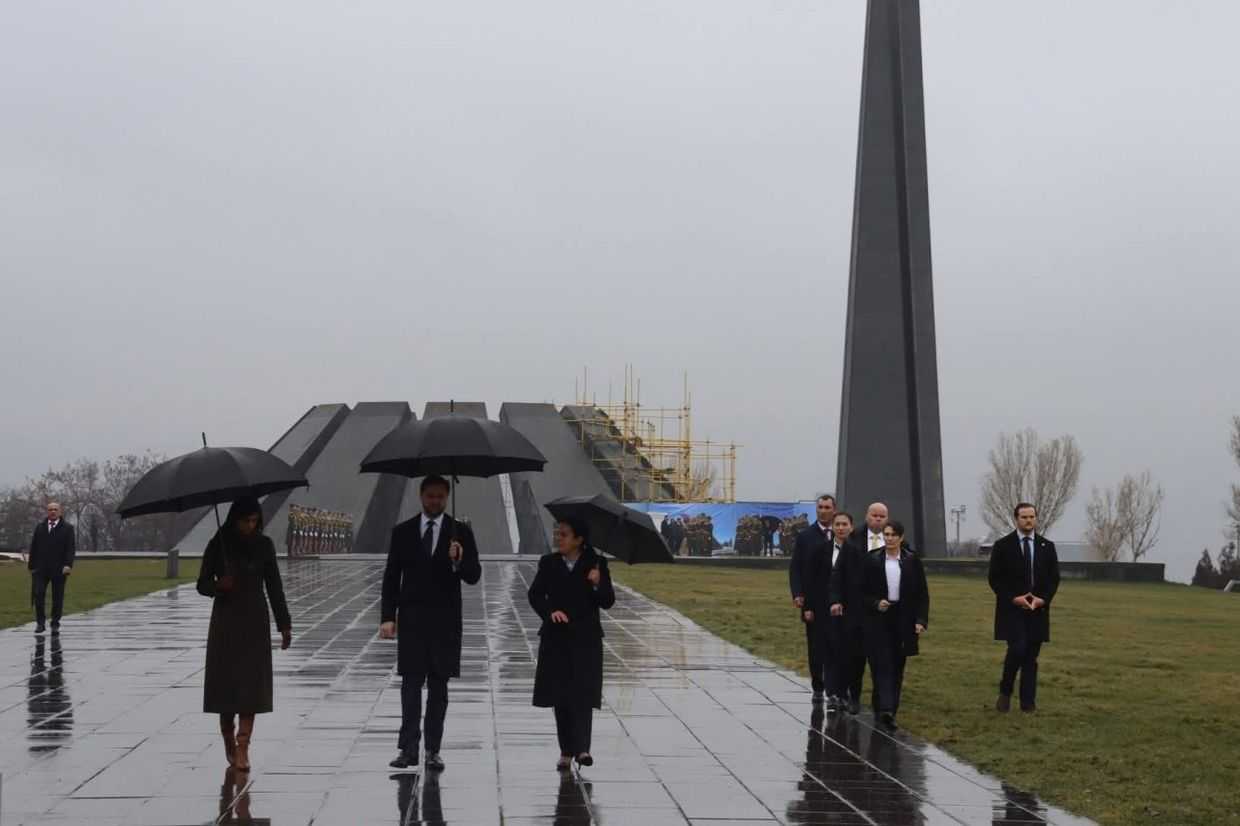Netanyahu falsely claims Israel recognised Armenian Genocide, says he recognises it

Israeli Prime Minister Benjamin Netanyahu has appeared to recognise the Armenian Genocide, while also falsely suggesting that the Israeli Parliament had already passed a resolution recognising the genocide.
Netanyahu’s statement came on Wednesday in an interview with US controversial podcaster Patrick Bet-David, who is of Armenian and Assyrian descent. Bet-David is a highly controversial figure, known for spreading conspiracy theories and platforming Holocaust deniers.
Bet-David said that if there was ‘any country that I would have expected to be on the list that recognised the Armenian, the Assyrian, and the Greek genocide it would be Israel’.
In response, Netanyahu falsely claimed that Israel’s Parliament ‘passed a resolution to that effect’.
When pressed by Bet-David on why no Israeli prime minister had recognised the genocide, Netanyahu responded saying: ‘I just did. Here you go’.
A tumultuous history in the Knesset
Israel has not officially recognised the Armenian Genocide as of Tuesday.
Netanyahu was apparently referring to the Israeli Parliament’s Education, Culture, and Sports Committee’s recognition of the Armenian Genocide back in 2016.
However, the parliament itself had several failed attempts either to discuss or to vote for it.
Resolutions for the recognition of the Armenian Genocide failed to be adopted in 2007 and 2011. The latest failure came in 2018, when Israel’s Parliament rejected the bill ‘after a first-ever debate on the sensitive issue held on the Israeli Parliament floor’, RFE/RL reported.
According to the Times of Israel, Israel’s ex-president, Reuven Rivlin, was an outspoken advocate for the recognition of the Armenian Genocide as Parliamentary Speaker. However, as president, in a 2015 UN address on centenary of the Armenian Genocide, Rivlin refrained from using the word ‘genocide’.
Previously, when relations with ‘Turkey were at an apex in 2001, then-foreign minister Shimon Peres outright denied “Armenian allegations,” denouncing them as an effort to create a parallel with the Holocaust’, the Times of Israel wrote.
The recognition of the Armenian Genocide has remained a highly politicised issue for Israel, due to its complex relations with Turkey, which, as the successor state of the Ottoman Empire, denies that the genocide took place. Others have argued that Israel’s recognition would diminish the status of the Holocaust as a historically unique genocide in terms of number of victims.
Netanyahu’s statement on Tuesday came amid diplomatic tensions between Turkey and Israel over the war in Gaza.
Previously, in March 2024, Netanyahu warned Turkish President Recep Tayyip Erdoğan over the latter’s criticism of Israeli conduct in the war.
‘Israel, which adheres to the laws of war, will not accept moral sermons from Erdoğan, who supports the murderers and rapists of the Hamas terrorist organisation, denies the Armenian Genocide, massacres Kurds within his own country, and exiles dissidents and journalists’.
The recognition, which could have been expected to be exciting news for Armenia, received a frosty reception from the public, considering Israel’s close ties with Azerbaijan — namely its sale of weapons which were used in the Second Nagorno-Karabakh War and subsequent clashes with Armenia, as well as Israeli war crimes in Gaza.
There was a similar reaction from some parts of Armenian society after Netanyahu’s latest comments on the matter.
‘When Netanyahu, a war criminal carrying out genocide in Gaza, speaks about the recognition of the Armenian Genocide, Armenians should simply tell him: “Shut your mouth” ’, political analyst Hakob Badalyan wrote on Facebook on Wednesday.
In turn, Aram Hamparian, the Executive Director of the Armenian National Committee of America (ANCA), an influential Armenian diaspora organisation, made a more balanced statement regarding the issue.
He noted that Netanyahu’s ‘tack toward long withheld Israeli recognition of the Armenian Genocide [...] must, if it is to represent more than an attempt at tactical cover for its transgressions, be followed by a sharp break with Israel’s military alliance with Azerbaijan and public pressure on Turkey to abandon its denial and obstruction of justice for the Armenian Genocide’.
US steps back?
Over 30 countries have recognised the Armenian Genocide, with the US under President Joe Biden’s administration recognising it in 2021.

However, since Biden’s departure from office, President Donald Trump’s administration appears to be shying away from using the term ‘genocide’ when discussing the tragedy, including in its latest statement issued in April 2025 commemorating it.
The omission of the word was quickly noticed and condemned by Armenian media and advocacy groups, and was also perceived as a hint at a change in the US approach to recognising the Armenian Genocide.

The massacres by the Ottoman Empire resulted in the deaths of nearly 1.5 million Armenians in the early 20th century, and the recognition of the genocide had until recently been one of Armenia’s top foreign diplomacy priorities.
However, in October 2024, Armenian Foreign Minister Ararat Mirzoyan said that the international recognition of the ‘is not our number one priority’.
Instead he noted that the number one priority of Armenia’s foreign policy is to ensure peace and stability around Armenia, as well as the normalisation and development of relations with neighbouring states.












